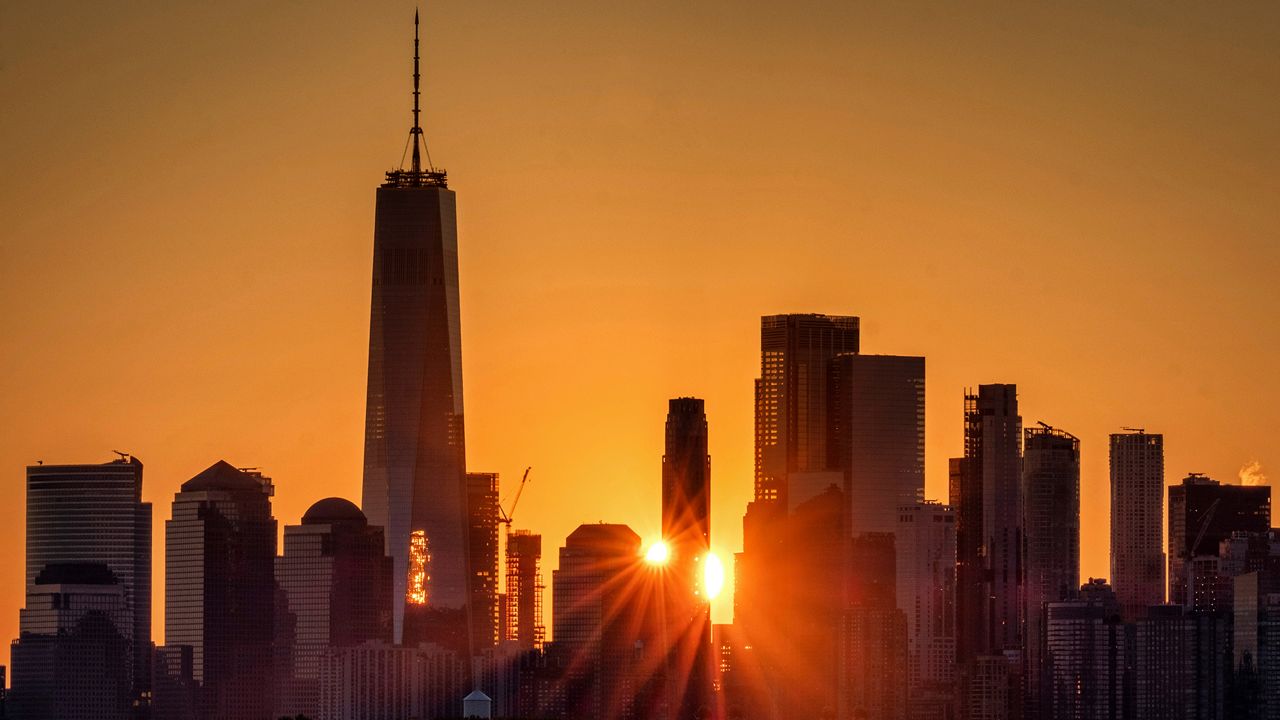New York City is gearing up for a weekend of extremely high temperatures.
The National Weather Service has issued an excessive heat warning, which will be in effect for the five boroughs from noon on Friday to 8 p.m. Sunday.
Mayor Bill de Blasio has declared a state of local emergency due to the extreme heat.
What will the weather be like?
Temperatures are expected to top 90 degrees on Friday, Saturday and Sunday. The forecast calls for a high temperature of 93 on Friday, 99 on Saturday and 97 on Sunday.
The humidity will make the weather feel even warmer than that. The heat index could get as high as 105 on Friday, and as high as 110 on both Saturday and Sunday.
This would be the city's first heat wave of 2019. A heat wave occurs when temperatures top 90 degrees for three or more days in a row.
The heat and humidity is expected to break by Monday. The forecast calls for a high temperature of 83 on Monday.
Where are some places you can stay cool?
City pools will be open an extra hour from 11 a.m. to 8 p.m., and beaches will be open until 7 p.m. during the weekend.
The city says 500 cooling centers are open across the five boroughs for New Yorkers that do not have air conditioning. They will be at places like libraries, community centers, senior centers, and city public housing facilities. To see a list of cooling centers, call 311 or visit nyc.gov.
The New York Public Library will have five additional branches open in three boroughs from 1 p.m. to 5 p.m: the Highbridge Library and Soundview Library in the Bronx, the Morningside Heights Library and Harlem Library in Manhattan, and the Stapleton Library on Staten Island. Seven other libraries in those three boroughs will also be open as planned.
The Department of Environmental Protection will have Water-on-the-Go portable drinking water fountains positioned at busy pedestrian areas across the five boroughs from Friday to Sunday.
For those looking to beat the heat in the streets, residents are reminded to get FDNY-approved hydrant caps from their local firehouse.
What are some tips on how to beat the heat?
Here's a list from the Mayor's Office:
• Go to an air-conditioned location, even if for a few hours.
• Stay out of the sun and avoid extreme temperature changes.
• Drink water
• Wear lightweight, light-colored clothing when inside without air conditioning or outside.
• Protect your pets and service animals when extreme heat strikes:
• Never leave pets in the car. Temperatures rise quickly even with the windows down and can be deadly for your pet. Call 911 if you see a pet or child in a hot car.
• Be sure your pets have access to plenty of water, especially when it is hot.
• Participate in activities that will keep you cool, such as going to the movies, shopping at a mall, or swimming at a pool or beach.
• Make sure doors and windows have tight-fitting screens and, in apartments where children live, window guards.
• Never leave your children or pets in the vehicle, even for a few minutes.
• Check on your neighbors during a heat wave, especially if they are seniors, young children, and people with disabilities.
What are some of the warning signs of heat illness?
Call 911 immediately if you or someone you know has:
• Trouble breathing.
• Hot dry skin
• Rapid heartbeat.
• Confusion, disorientation, or dizziness.
• Nausea and vomiting.
If you or someone you know feels weak or faint, go to a cool place and drink water. If there is no improvement, call a doctor or 911.
Conserving Energy During the Heat
New Yorkers should also conserve energy as demand will be higher during the extreme heat.
The city recommends that air conditioners be set no lower than 78 degrees when in use, and turned off when no one is home. (As part of the heat emergency declared by the mayor, owners of buildings 100 feet or taller were directed to set building thermostats to 78 degrees from Friday morning to Sunday evening to conserve energy.)
Here is a list of tips provided in a Con Edison press release on how to save energy during the hot weather:
• Turn off air conditioners, lights and other appliances when not at home and use a timer to turn on your air conditioner about a half-hour before arriving home;
• Make sure air conditioner filters are clean so the units will run at peak efficiency;
• Set thermostats to the highest comfortable temperature. Each degree lower increases cooling costs by 6 percent;
• If you have a room air-conditioning unit, close off the rooms not being used; if you have central air, block the vents in un-used or vacant rooms;
• To reduce heat and moisture in your apartment or home, run appliances such as ovens, washing machines, dryers and dishwashers in the early morning or late at night when it’s generally cooler outside. Use a microwave to cook, or barbecue outside, if possible;
• Keep shades, blinds and curtains closed. About 40 percent of unwanted heat comes through windows. Simply drawing blinds and curtains, which act as a layer of insulation, can reduce heat in your apartment or home;
• Use fans instead of air conditioners, but be sure to leave windows open for ventilation. Fans use as little as one-tenth the energy as air conditioners.



